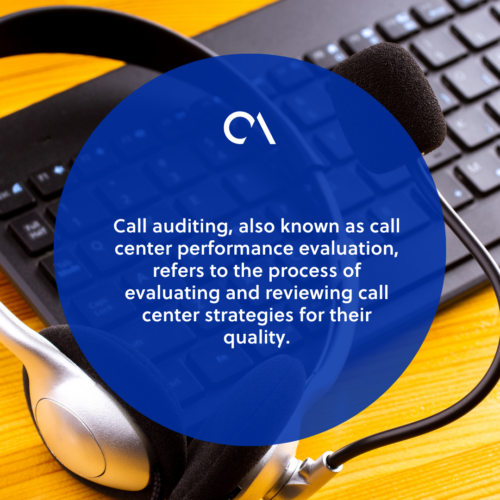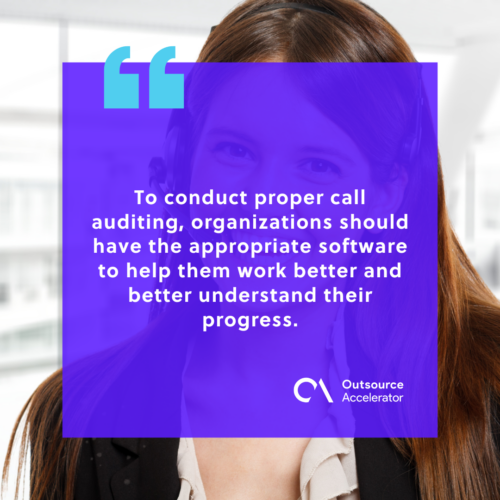

An eight-minute guide into call auditing services
Hiring a call center is more than forming a team to make and receive customer calls. Clients must ensure that their team’s performance is at par with their expectations.
As much as customers want to assure themselves of getting quality products, clients also want to guarantee getting quality service. After all, their call center team’s faults could pretty much affect their branding and credibility.
This is where call auditing plays its role.
Like in quality assurance, call auditing identifies what needs to be done to improve a call center team. Find out everything about this procedure in this quick guide.
Call auditing, also known as call center performance evaluation or call center audit, refers to the process of evaluating and reviewing call center strategies for their quality. It points out a call center team’s efficiency, effectiveness, and compliance levels.
Audits done successfully can help determine the areas of opportunity for a company, its strengths, weaknesses, and aspects needing improvement. Its results are compared to best practice companies as a benchmark for their operations.
Get 3 free quotes 4,000+ BPO SUPPLIERS Learn moreInternal call auditing can be done by experienced agents, supervisors, or internal auditors. Meanwhile, reports derived from successful call auditing are used as tools for transparency to clients to determine where they are doing well and what needs to be improved.

Call auditing purposes can be classified into two categories. These are general audit, which covers a majority or all purposes, and specific audit, which includes one or a few listed purposes.
Specifically, call auditing is done for the following purposes, including:
Call auditing can be done with the same tools and software used in call quality assurance. But, since it involves a larger scale of call center performance, audits can be patterned according to the client’s priority and other considerations.
When auditing calls, internal auditors look at the following aspects:
Like in simple quality assurance, call auditing aspects are categorized into different key performance indicators (KPIs) taken into consideration:
The amount of inbound and outbound calls recorded in a certain period can determine the team’s efficiency. Usually, the increase and decrease in customer calls can indicate the satisfaction customers experience with a certain product or service.
Get the complete toolkit, free Learn moreWhile CSAT and NPS help measure satisfaction, internal call auditing can determine the root cause of their negative feedback, if any.
Clients can give a simple checklist to audit each customer call and analyze its quality.
In line with measuring call quantity, measuring the average number of calls an agent makes or receives daily is essential.
Statistics say that a call center agent usually takes up to 50 calls per day, whether inbound or outbound. This may increase or decrease due to demand and allocation for each agent in a team.
Usually, having more calls to handle than the agents to take them indicates the need to increase their staff.

Meanwhile, call handling time gives clients an overview of their agent’s efficiency in resolving queries. This measures the time they need to handle a call, from picking up the phone to after-call work time (ACWT).
A high call handling time indicates customers are waiting too long to resolve their issues. This might be reflected in their speed of answering, their time in queue, and the accuracy of their process.
A high call handling time could even indicate their need for improved staff training or additional employees to take calls.
Not every issue is resolved during their first call. However, this instance opens the opportunity for improving their resolution rate.
Their efficiency in handling calls could impact the time it takes to resolve a certain task. This includes an agent’s agility in pulling up customer information, knowledge of a specific product, and friendliness throughout the call.
An abandoned call can result from customers waiting too long to get accommodated. This could even result in high customer churn and rapid sales drop.
Call abandonment is usually caused by a high average speed of answer (ASA) or handling time. Especially with a heavy volume of customers, agents might be occupied with handling multiple calls.
This could signal that a company should either improve its processes or hire new agents.
Lastly, auditing call quantity can be related to forecasting accuracy.
If the actual calls they receive are higher than their forecast, it signals that their agents might be overworked. If it’s lower, meanwhile, then they underutilize their agents.
Apart from the call auditing metrics, auditors also look at customers’ level of satisfaction with their experience during a call. They check the following metrics, as seen below:
The client and their service provider should work on call auditing procedures to ensure they get the most accurate results to improve their team.
Here are some best practices for conducting call auditing in a call center team.
The team must form ethical guidelines for call auditing.
This should include the company’s purpose and goals in auditing, the entire auditing procedure, and the metrics to measure each call.
Companies provide their auditing checklist for companies to evaluate. Online tools such as Process Street can provide guidelines for making one.
Some metrics can be more urgent than others, depending on the company’s goal in auditing. With this, internal auditors should focus on the crucial ones that can help improve the call center team.
Having proper communication is the key to conducting a proper call auditing process. Whether a call center team works miles away or is only a few hours from their client, they need to reach out and check on their clients at every step of their procedure.
This is why having a point person helps them conduct auditing better. The team can appoint the team leader or operations manager if they are included in the auditing team.
Lastly, always remember to keep all records of each call to be audited, including transactions, daily accounts, and other related aspects.
Call centers keep their best calls and positive feedback as proof of having a high CSAT rating. This ensures that the team gets the most accurate results on their reports.
Developing and implementing corrective actions based on the results should be the last step in the call auditing process.
Businesses should put their call auditing results to good use by imposing measures that will prevent negative experiences in the future and improve their services further. At the same time, these measures should be constantly monitored according to their effectiveness periodically.
To conduct proper call auditing, organizations should have the appropriate software to help them work better and better understand their progress.
A good call auditing software has the following qualities:
With that said, here are some of the call auditing software and tools a call center team can use:

Talkdesk is one of the leading contact center/CX solutions for customer-obsessed companies. Being an all-in-one customer service platform, some of its features include call recording, workflow automation, ticket creation, and integration with CRM systems and websites.
Among the platforms listed, Ameyo offers individual call insights through its “agent self-monitoring” feature.
Moreover , it enables real-time call monitoring by supervisors and call recording so auditors can get back to them when needed.
Like Talkdesk, Nice CXone provides an all-in-one contact center platform that makes auditing easier for teams and their clients. They combine the “best-in-class” omnichannel routing and workforce automation features in a n open cloud format .
Process Street may be a unique platform in the list. Yet, call and contact centers use this to create SOPs, manage workflows, and organize monitoring processes using checklists. They even provide checklist templates that users can edit and utilize at their will.
As much as possible, clients should have an outsourcing partner they can count on when it comes to call auditing. Most BPOs in offshoring countries can now provide this procedure along with their offered services.
Companies must establish proper communication and relationship with their service provider for this.